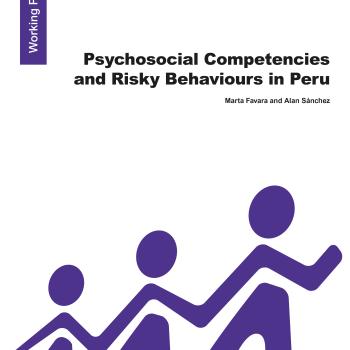Publication Information

There is a growing concern about the prevalence of risky behaviours among young people, which ultimately lead to worse outcomes later in life, including lower salaries and worse socio-economic and life outcomes. On the other hand, there is little evidence about the prevalence of these behaviours and their determinants in the context of developing countries.
Our aim is to try to fill this gap, using unique individual-level panel data from Peru, following a cohort of about 700 children for more than a decade between the ages of 8 and 19. More specifically, the aim of this study is to get a better understanding of the link between psychosocial competencies related to the concepts of self-esteem, self-efficacy and aspirations, and risky behaviours at a crucial period of transition between adolescence and early adulthood.
We document a high prevalence of risky behaviours, with one in two individuals engaging in at least one risky activity by the age of 19, and a dramatic increase between ages 15 and 19. Our analysis of the predictors of risky behaviours identifies a group of adolescents vulnerable to engaging in risky behaviours. This is particular relevant for boys living in urban areas who have grown up in single-parent households with a large number of siblings. Most importantly, we find a negative correlation (robust to a number of specifications) between early self-esteem (measured at the ages of 12 and 15) and later risky behaviours. Further, aspiring to higher education at the age of 15 is correlated with a lower probability of drinking alcohol and of engaging in criminal behaviours at the age of 19. Similarly, such aspirations protect girls from risky sexual behaviours.Although the present analysis is not sufficient to claim any causal relation between socio-emotional competencies and risky behaviours, our results suggest that psychosocial competencies, and self-esteem and high aspirations in particular, might play a role in reducing risky behaviours. Policies aimed at promoting soft skills during childhood and adolescence constitute an important mechanism for reducing risky and criminal activities among young people. To our knowledge this evidence is unique in the developing-countries context.

There is a growing concern about the prevalence of risky behaviours among young people, which ultimately lead to worse outcomes later in life, including lower salaries and worse socio-economic and life outcomes. On the other hand, there is little evidence about the prevalence of these behaviours and their determinants in the context of developing countries.
Our aim is to try to fill this gap, using unique individual-level panel data from Peru, following a cohort of about 700 children for more than a decade between the ages of 8 and 19. More specifically, the aim of this study is to get a better understanding of the link between psychosocial competencies related to the concepts of self-esteem, self-efficacy and aspirations, and risky behaviours at a crucial period of transition between adolescence and early adulthood.
We document a high prevalence of risky behaviours, with one in two individuals engaging in at least one risky activity by the age of 19, and a dramatic increase between ages 15 and 19. Our analysis of the predictors of risky behaviours identifies a group of adolescents vulnerable to engaging in risky behaviours. This is particular relevant for boys living in urban areas who have grown up in single-parent households with a large number of siblings. Most importantly, we find a negative correlation (robust to a number of specifications) between early self-esteem (measured at the ages of 12 and 15) and later risky behaviours. Further, aspiring to higher education at the age of 15 is correlated with a lower probability of drinking alcohol and of engaging in criminal behaviours at the age of 19. Similarly, such aspirations protect girls from risky sexual behaviours.Although the present analysis is not sufficient to claim any causal relation between socio-emotional competencies and risky behaviours, our results suggest that psychosocial competencies, and self-esteem and high aspirations in particular, might play a role in reducing risky behaviours. Policies aimed at promoting soft skills during childhood and adolescence constitute an important mechanism for reducing risky and criminal activities among young people. To our knowledge this evidence is unique in the developing-countries context.

